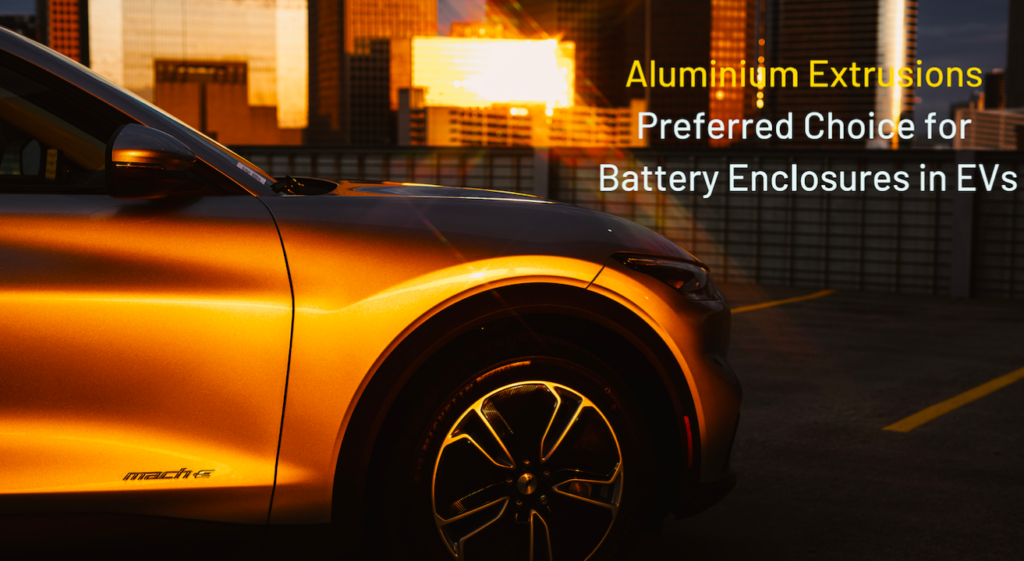Aluminium Extrusions – The Preferred Choice For Battery Enclosures In EVs

The last two years have seen tremendous growth in the passenger vehicle segment in electric vehicles with sustained interest in the two and three wheeler market as well. Global awareness of depleting fossil fuels and eagerness in seeking alternatives has given the impetus towards Electric Vehicles. Electric cars are expected to account for more than 30% of the total market share in 2030.
Aluminium is considered a high performance metal and has a significant role to play in the Electric Vehicle production. It has relevance in both the manufacturing phase as well as in the charging infrastructure requirements.
One of the most popular uses of extruded aluminum now is as the battery enclosure for Electric Vehicles. As the name indicates a battery enclosure is an enclosure to hold the battery modules and to protect them from damage due to temperature variations and from shocks. Aluminium with its lighter weight helps with complex and customized formability essential for deep draws of vehicle battery pack design and in reducing the overall vehicle weight which has a direct impact on the energy consumption.
An ideal battery enclosure that uses aluminium extrusions can significantly simplify the assembly process and fixation of battery modules. When the complete battery enclosure is made of extruded aluminium, it helps in creating a natural electromagnetic shield that prevents interference with other electronic components in the vehicle. Aluminium extrusions also allow better energy absorption in case of an accident, compared to steel or carbon fibre.
Properties that make aluminium a preferred option for battery enclosures
Lightness – A battery enclosure made of extruded aluminium can be 50% lighter than one made of steel. It will be a very energy efficient option for original equipment manufacturers and battery pack manufacturers. This will afford more space for vehicles with large power packs too.
Thermal conduction – The battery enclosure should have ideal thermal conductivity. They must help in keeping batteries cool in hot weather and warm in cold weather. The thermal transference capabilities of the enclosure can have a significant bearing on the life of battery modules. Battery performance also varies with the quality of aluminium used.
Strength and resistance to impact – The batteries need to be protected from vagaries of weather, road debris, stone impacts or possible vehicle crashes. So it is important that a high strength material like aluminum is used for holding the batteries. The corrosion resistance it has also makes aluminum a safe bet.
When we multiply the projected sales number of Electric Vehicles with an average 80 kilograms of extruded aluminium used per vehicle, the requirement globally is estimated to exceed three million tons of extruded aluminium by 2040. Supplies from top of the line aluminium extrusions manufacturers are hence imperative to ensure high performance and match the quality standards. Some of the world’s leading EV manufacturers like Nissan, Volkswagen and Tesla are also moving to aluminium instead of steel -which they are used to traditionally- for making their battery enclosures. The possibility of an easier end-of-life recycling, anti corrosive properties and durability makes aluminium a much more cost effective choice as well.
With multiple players taking centre stage in manufacturing EV domestically, aluminium extrusion manufacturers in India like KMC Aluminium who are one of the leading aluminium profile manufacturers are looking at a huge ramp up of sales numbers. They figure among the top players in the list of aluminium extrusion companies in india. To know more about one of the best aluminium companies in Chennai that can cater to a wide variety of aluminium extruded products log on to https://kmcaluminium.com/
Image courtesy: unsplash


Recent Comments